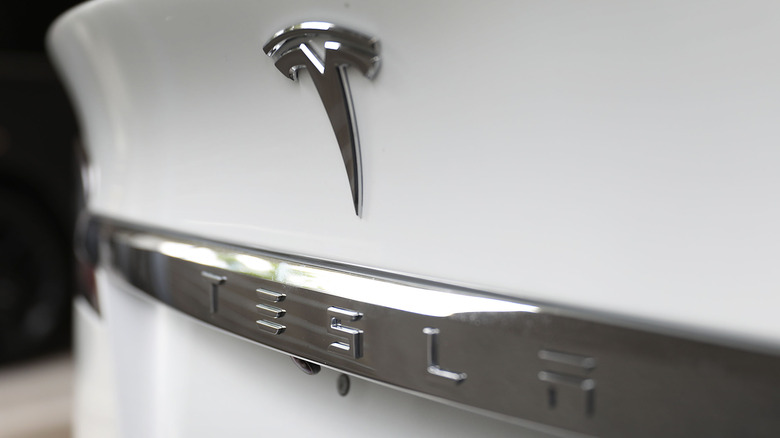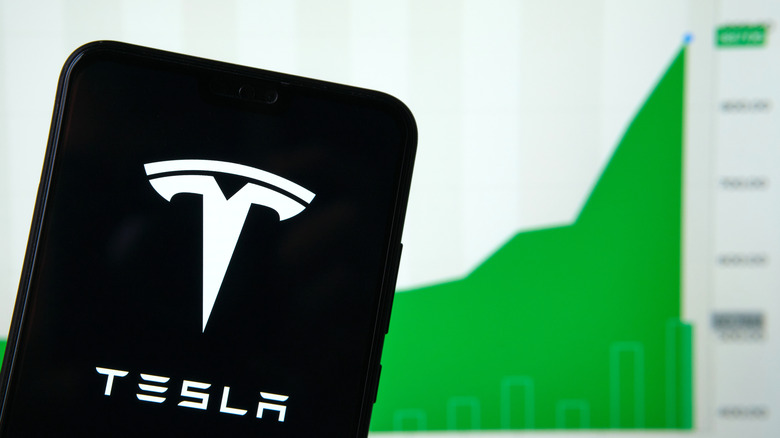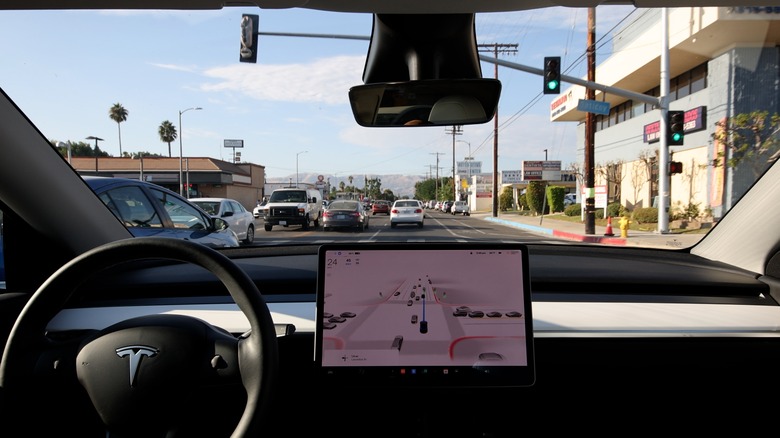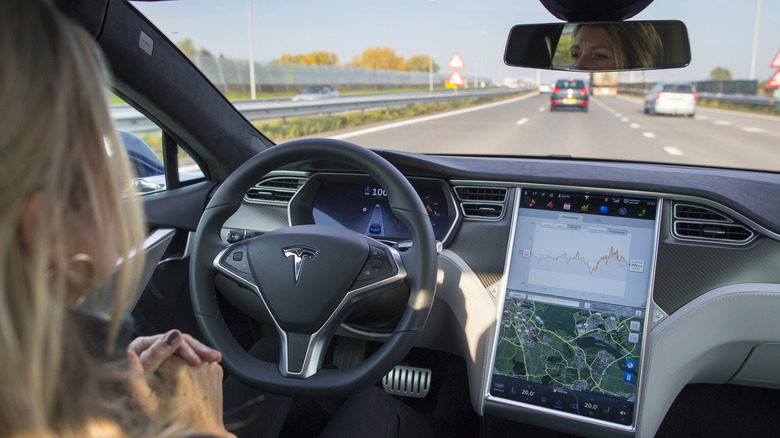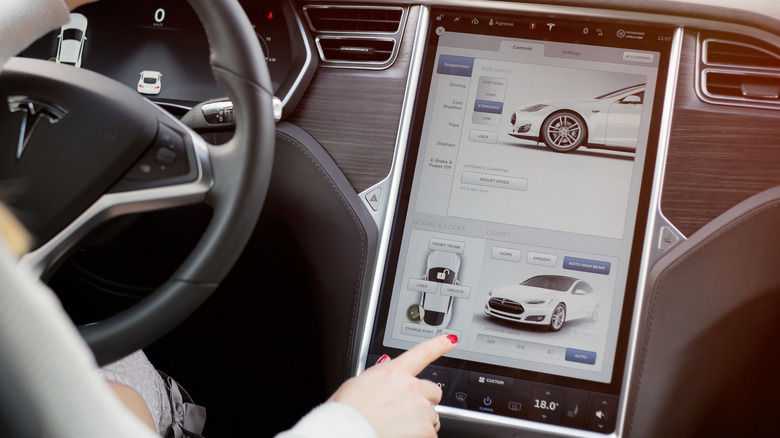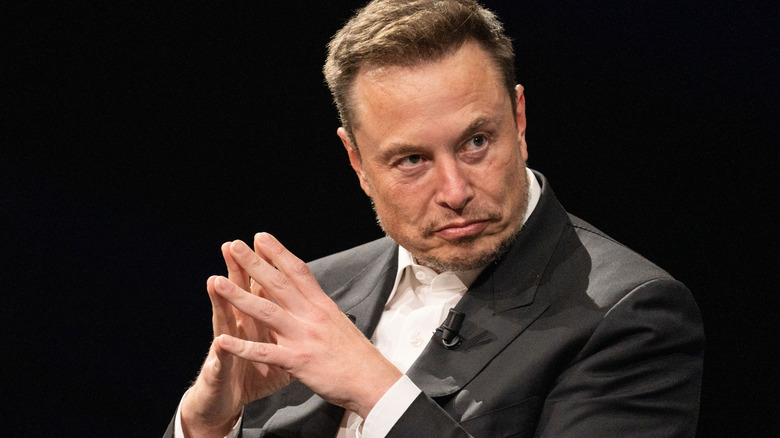5 Reasons Why So Many People Hate Tesla
Since its founding in 2003, Tesla has effectively become the face of the electric vehicle market, setting the standards against which EV efforts from other major automotive manufacturers are often judged. In that time, Tesla has released numerous vehicles, gradually developing its EV tech and accompanying features further, as well as broadening its influence with the placement of its proprietary car chargers. It's thanks to this ubiquity that Tesla is a fairly popular company. It is not, however, a universally popular company.
For the past two decades, some automotive consumers have had no shortage of grievances with Tesla, both in terms of problems with its cars and their features — as well as with its corporate attitude. There's no such thing as a universally beloved company, of course, but there are reasons that Tesla's detractors have maintained their stance against the company. These reasons are surprisingly numerous, but there are at least five that are worth highlighting.
The price of Tesla vehicles
Compared to when Tesla vehicles were first made available, they're leagues more affordable. The original Tesla Roadster cost nearly $100,000, meaning that nobody who wasn't already planning on buying a luxury sports car could afford it. By comparison, you could get a low-end Model 3 or Model Y these days for about half of that.
That said, while the cars aren't as expensive as they used to be, they're still not a drop in the bucket. For those who don't have thousands of dollars lying around to drop on a new car, $50,000 is still prohibitively expensive. There are much more affordable alternatives in the traditional combustion engine scene, especially if you buy used, which makes Tesla vehicles seem a bit too high-shelf by comparison.
Additionally, buying a Tesla is also an investment in the assumption of wider electrical charging adoption down the line. If you buy a Tesla, but don't have any chargers installed near you, then you've effectively invested in a very expensive metal box with limited charging opportunities.
Potential invasions of privacy
Most Tesla vehicles feature built-in dash cams designed to capture footage of the driver and passenger in the event of an accident. That in itself isn't a big deal, but the fact that you don't get to decide whether the camera is installed and when it turns on is concerning from a personal privacy perspective. There's also the matter of Tesla vehicles' "Sentry Mode," which activates the cameras when the vehicle is not in use to monitor for potential theft.
The idea of having a camera pointed at your head every time you go for a drive is understandably disconcerting for some drivers, especially with Tesla's ongoing interest in face-recognition AI algorithms. There are also concerns that bad actors could remotely access a Tesla's cameras to steal private footage of drivers, and that Tesla itself could use the footage for monitoring or unsanctioned market research. Either way, for those who value their privacy, it's a big concern.
Autopilot shortcomings
One of the major goals of Tesla's modern vehicle line is the first truly seamless autopilot experience. The idea of self-driving cars has been the stuff of science-fiction dreams for generations, so it's a laudable goal to strive toward. However, in its pursuit of true autopilot, Tesla vehicles have instead achieved a high tendency to fail or malfunction, as well as invited controversy and investigation into the automaker's self-driving "beta."
According to a report by The Washington Post released in June of this year, Tesla's autopilot system has either been involved in or directly caused approximately 736 car crashes since 2019. There have been at least 17 confirmed driver, passenger, or pedestrian fatalities caused by these many crashes. Over 360,000 Tesla vehicles received a recall for its self-driving beta software driving unsafely in several high-traffic situations.
Per the NHTSA, the recall was issue because the installed (or pending installation) Full Self-Driving Beta was causing certain Tesla vehicles to "exceed speed limits or travel through intersections in an unlawful or unpredictable manner," which could lead to a serious accident.
As ambitious as Tesla's pursuit of self-driving technology is, these numbers don't lie: The tech is not perfectly road-ready, and the company's insistence on including it has warded off drivers fearful for the safety of themselves and those around them.
Poor update support and recalls
While Tesla vehicles are cars in the literal sense, they do operate more like giant computers with wheels compared to traditional gas cars. Much like your personal computer, Tesla vehicles receive firmware updates at regular intervals which, in theory, can potentially solve problems without the need for a recall of affected vehicles. However, there have been instances where Tesla's updates have instead caused new problems, or exacerbated existing ones.
One prominent example of this occurred in November of 2022 when Tesla was forced to recall over 40,000 Model S and Model X vehicles after a botched update caused their electronic power steering features to suddenly fail while handling rough terrain. Another example in November 2022 was a recall issued for the seatbelt's restraint control module, which could potentially prompt the Tesla vehicle's passenger air bag to incorrectly deploy "during certain low-speed collision events," according to the NHTSA.
While most Tesla recalls have been solved with over-the-air updates, it's already scary enough dealing with sudden problems in your car's inner workings. The idea of your car suddenly breaking down because of a bad update is inexcusable. It's bad enough to get a botched update on your home computer, you don't need one that could potentially put you in danger on the road.
Tesla's CEO Elon Musk
It's no secret that Tesla's founder and CEO, Elon Musk, can be a bit of a handful. While he is an outspoken proponent of technological development, Musk has also repeatedly made statements that many have found annoying or offensive, as evidenced in recent years with the COVID-19 pandemic and his acquisition of Twitter (not to mention the latter's recent bizarre renaming to "X").
Musk has also weaponized his celebrity status to influence the direction of the western economy, not just in how he conducts business, but with simple statements on social media. Prior to his acquisition of Twitter, Musk would frequently make loaded or inflammatory statements on his personal Twitter profile about prominent businesses or investments, which in turn caused surges or sell-offs.
With all of these qualities, Musk has garnered something of a chaotic reputation, and those who have grown tired of him don't want anything to do with him — or "his" cars.
